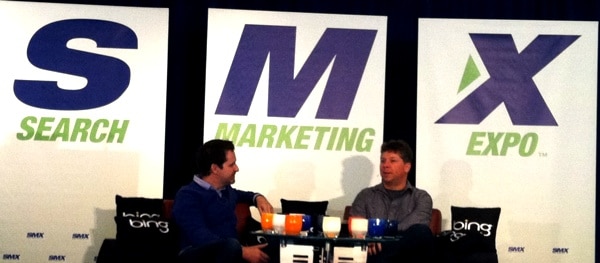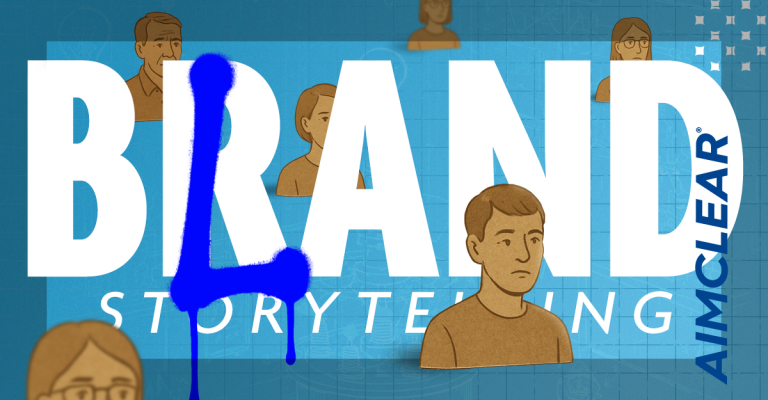Coffee: check. Delicious looking miniature-sized pastry: check. Power outlet: check. Wifi: muhhh. Day 2 of #SMX Advanced 2012 kicked off at a slightly less breakneck pace, much to the pleasure of pretty much anyone who attended last night’s After Dark party at the Aquarium, with a charming candlelit chat between Search Engine Land’s own Danny Sullivan and Derrick Connell, corporate vice president of Bing’s Search Program Management team.
Changes are a-bubblin’ over at Bing, from a major (and now officially 100% rolled out) redesign of the homepage and main SERPs to significant updates to Webmaster tools (launching today). Together amongst a sea of cozy Bing pillows, Danny posed thoughtful questions to his guest, and Derrick discussed the challenges and opportunities that will arise due to these changes, for users and marketers alike. Read on for the full effect.
Danny quieted the crowd (“Criss cross, apple sauce,”) and introduced Derrick, who would begin by specifically discussing some recent changes by Bing by way of a couple live demos.
Embracing The New Web
On Friday, Bing rolled out 100% the new version of its homepage and general SERPs. The focus is on actions, places, people, and things. The three main components of change are:
- Core search (the main section of search results)
- Snapshot
- Sidebar
Generally speaking, the new UX has been refactored to not overload users with additional things (e.g. in-line social). The refactoring was based, apparently, on a good amount of user feedback. That’s nice!
“People, as an entity, should be treated as a very special thing.” -Derrick Connell, Bing
Special things get their own homes, enter stage right (literally!) a new piece of real estate called the “sidebar.” The sidebar features info / data / additional resources on people related to a specific query. This content used to be the “social” aspect in the SERPs, removed to declutter the core search. But it’s not just an aesthetic enhancement… Derrick noted that overall, the search experience is on average 20% faster now.
Some Demos
- Go to Bing.com, search for “dl1642”. You’ll see a very clean page – query suggestions go in-line and the page is generally cleared up.
- A longtail query might bring back a bit more data. “Porsche boxster,” for example, brings back ads, the official site with deep links, and a “child answer” (basic, unbiased facts).
- A query like “new york restaurants” might bring back no definitive ago result (well, maybe something like “tripadvisor.com, but not a specific restaurant). There’s a map on sidebar with bubbles that correlate to links in core SERP. Also, many ads.
- Rich ads are still in the SERPs, depending on the query. Watch video for an ad, search for locations right in ad.
- Reviews can show up in rich ads, too. Good for user (more info) and good for advertiser (more clicks).
More On The Sidebar…
The sidebar, rich with social content, kind of looks like a column in TweetDeck. For the “new york restaurants” query, the sidebar populates with food critics, chefs, and other experts related to the query.)
The sidebar also populates with content and friends straight from your Facebook, provided you’re logged in and have your account connected. Seriously, it goes deep. If you’re fully connected to FB and searching on Bing, you can see photos from friends albums that have same KWs as your query. That means you can essentially search your friends’ Facebook photos and albums by keyword when you do so using Bing. Useful? Who knows. Fun? Yup!
Derrick mentioned that privacy settings from Facebook are ported over to Bing, so you have a cohesive privacy XP. (Right…).
Another interesting note: The sidebar includes suggested people to circle on Google+. #NoHaters
The demo wrapped up, and Derrick took his seat next to Danny to resume their candid chat. We’ll run through the poignant gems in a paraphrased interview format…
Danny Sullivan: Why does Bing feel the separation of content in sidebar from SERP is the better route?
Derrick Connell: Putting people in the organic SERPs is unnatural. How do you rank people? It just doesn’t feel natural. People are important – they deserve their own real estate. And really, organic results are what people want 85% of the time. If they want the social aspect, they can just look to the right. We separate so we can rank the organic according to our algo, and then “rank” – categorize people separately.
DS: Do you see social signals as picking up or taking over from links, going forward?
DC: I don’t know that I see them taking over… they’re an important signal, one of many. I don’t think social signals will take over links any time soon. But incorporating them in ranking algo is important, for sure.
DS: Social indicates freshness.
DC: Yes. It’s all about freshness. Reviews for a restaurant last night are more important than reviews from last year, or even six months ago.
DS: Among the signals you’re pulling in, you’re looking at things like Google+. So, it’s not just Facebook
DC: We don’t want to build a social network. Our job as a search engine is to find the social signals and rank content from there. We have a great working relationship with Facebook. We talk to them every day, including the weekends. We’ve even had a couple hack days with Zuckerberg’s team, he was there one day. Some of the ideas they talked about were interesting. We didn’t do all of them… but they were interesting. Facebook has huge insights on what it means to be social, and we (Bing) have huge insights on search. We work together well.
DS: Let’s talk about relevancy scoring – how do you prove that Bing is just as good or better than its competitors?
DC: We have our own internal relevance judging… we were at the bottom when we started, and we’ve been closing the gap against competitors in recent months. Our studies have shown we were neck and neck (with Google, in terms of relevancy scoring), and our studies show now we’re just ahead. But there is a perception gap – we’ve done tests that show people sometimes just assume Google’s results are better.
DS: I actually did my own testing – switching back and forth between Bing and Google as my default engines. By the end of the week, I couldn’t really tell the difference. Which is… good.
DC: Ninety-nine percent of people will be surprised if they use both engines and realize we’re better than Google.
DS: When Bing first launched, there was big push of it as a “decision engine.” Is that still the case? Is that still the direction in which you’re heading?
DC: We shifted the focus a bit. The “decision engine” was a huge part of our initial marketing. Now, we’re focusing on the concept that “Bing is for doing.” We want you to be able to book a reservation, print your ticket, etc. right from the SERP. It is stilla decision engine, but we want to empower people to DO stuff. We’re still going to run TV campaigns, but the focus is shifting from branding to product-centric.
DS: Let’s talk a bit about your growth market share in the U.S. When you started, you guys had solid single-digit awareness… but now you’re up to 16-17%. What’s the goal?
DC: I’ll be happy on the journey when we get to 20%. There’s a tipping point at 20%… but it just keeps going, 30%, 40%. We just want to keep growing.
DS: Gains seem to be coming off of Yahoo folks who have been looking at Bing. Is your goal to eventually start yanking folks who all along were using Google?
DC: Google was growing 3 years ago, but they’ve kind of stalled out at 65%. We’re taking from Yahoo, but the goal is to eventually take from Google.
DS: I remember when there was a big update and suddenly “Bing” was on Xbox! It’s neat. But it’s not technically Bing, right? You’re not technically using the Bing search engine when you search on Xbox. It’s Bing as a brand for doing search. Is Bing becoming the branded verb, like Microsoft… for anything related to search, even if it’s not the actual search engine?
DC: Yes, sort of. Anything that features search is built by the Bing team, so it’s technically Bing. The Bing on Xbox is about finding and doing – it’s not the search engine, but it’s the action and the mission. It’s all the same functionality, from search to speech, Bing powers that, and it was created by Bing team.
DS: On the voice search – if i ask it if it’s raining, will it tell me if it’s raining outside? (And where to get tomato soup?)… What’s going on with voice search? Google had that, but no one remembers. Then Apple came with Siri…you guys had voice search before Google had voice search!
DC: It’s a big challenge with natural language – people ask longer queries (sometimes 10 words)… it’s not super easy to take natural language, map it to search, and bring back quality, accurate results.
DS: Speaking of, I assume you’re seeing the same kind of growth on mobile search as desktop search?
DC: I don’t have the numbers… we’re optimized for the Windows phone though, so we see most activity there.
DS: Windows 8.. it’s coming!
DC: Yes, we think it’s gonna be a big year. We’re talking about devices. We’re talking about a good year for everybody. There will be very specific apps that are integrated in the experience, apps powered by search that scale well internationally.
DS: How should I be doing as a publisher to let you know I am X, Y, Z entity?
DC: You don’t have to do much aside from what you’re doing. Have a presence on social channels, get engagement for your brand. As the Bing sidebar evolves and people play bigger role, social recommendations from friends will become increasingly important for brands. On a separate note, today we’ll be announcing a significant update to Webmaster tools, featuring new link exploring tools and SEO tools, among others. The update is called “Phoenix.”
Some final words on Schema.org:
- The Snapshot uses https://schema.org/ to extract data about entities – but not the social sidebar.
- If you make your data available so schema.org crawlers can pick it up, essentially what Bing will do is take the data in, westore it in a structured location, associate it with an entity, and when the entity shows up with the aglo results, the data is added to the SERP from there.
Big thanks to Danny & Derrick for a wonderful start to Day 2 of #SMX Advanced! Stick around AIMCLEAR blog for more coverage coming straight at you from Seattle.









